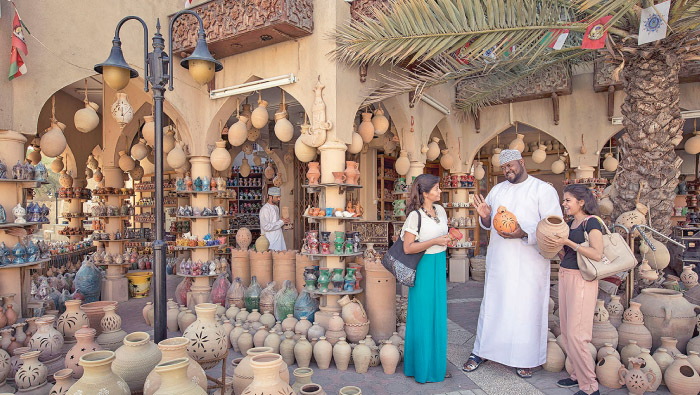
Muscat: Visitors to Omani souqs can experience the Sultanate’s deep heritage and rich culture when they come to the country.
Oman’s traditional souqs are filled with visitors from all over during the traditional tourist season, which vary across the country.
The traditional souqs throughout the Sultanate continue to keep their place as one of the top tourist spots. They continue to attract a growing numbers of Omanis, expats, tourists to experience Oman’s rich, diverse and ancient heritage and to have their senses stimulated by the aromatic smells of frankincense, various kinds of incense and Arabic perfumes.
Together with officials, the Ministry of Tourism (MoT) puts in efforts to promote these distinctive tourist destinations, under careful direction and with the right attention to represent Oman’s real and authentic culture and civilisation.
Each traditional Omani souq is distinct in terms of products and commodities such as traditional Omani gold, silver, textiles, leather, perfumes, ceramic, herbs, palm leaves, wool, natural medicines, honey, Omani sweets, traditional handicrafts and antique weapons.
While the goods available across Omani souqs may vary between one and the next, they are all unified in the architectural style inspired by Arab-Islamic architecture.
Some of these souqs are held on particular occasions, such as Eid al Fitr and Eid al Adha, while others are held on a particular dates for a few days each month, such as Al Mudhaibi Souq, or weekly, an example of this being Saniw Souq.
Omani souqs such as Muttrah Souq or Nizwa Souq, though, operate daily.
Highlighting the importance of the traditional Omani Souq, Mohamed al Hasni, a craftsman, said: “The traditional souqs are a legacy inherited by generations, and as they represent a priority destination for locals, expats, tourists and visitors. These Souqs are of great economic importance, because they host varied collections of traditional and modern products and goods for which the tourists, visitors and locals flock”
Nasir al Ismaili, a seller at Ibri Souq, said: “Having been a hub of trade exchange since a long time ago, Ibri Souq is one of the most famous, well known and prosperous traditional souqs in Oman. The souq hosts varied products and goods, such as clothing, frankincense, incense, perfume, mountain rose water, as well as foodstuff such as legumes grown locally. This is in addition to many shops of tailoring, gold and silver. The souq witnesses a big turnout throughout the year that increases during holidays and vacations.”
For his part, Yasser Al Busaidi, one of the textile traders at Muttrah Souq, stressed that the traditional souqs are a social and economic meeting place for sellers and buyers. Having a unique beauty and allure, Muttrah Souq is one of the most visited traditional destinations in Oman.
Characterised by narrow winding alleys covered by wooden roofs and a unique location, it is one of the busiest markets in the Governorate of Muscat. It begins at a gate facing the sea of Oman and the Muttrah Corniche and ends at another gate in the city`s old quarters, that used to previously receive the majority of visitors from other towns and villages.
In addition to being one of the oldest souqs in the Sultanate, Nizwa Souq is an important economic and tourist crossroads for the Willayat of Nizwa.
It hosts abundant traditional products and goods. Fridays are of special importance as on that day, the locals leave their homes in the surrounding areas early and head to the souq so that they can buy the best goods and commodities. The market also witnesses special importance in the weeks prior to Eid al-Fitr and Eid al-Adha.
Adjunct to the Arabian Sea, Al Husn Souq is one of the most famous traditional markets in Oman.
It hosts dozens of small shops selling incense and frankincense, which reflect the interest of the local women who are employed in traditional handicraft-making shops, which specialise in producing incense of different fragrances.
These shops are usually managed and operated by women who wear traditional dresses.